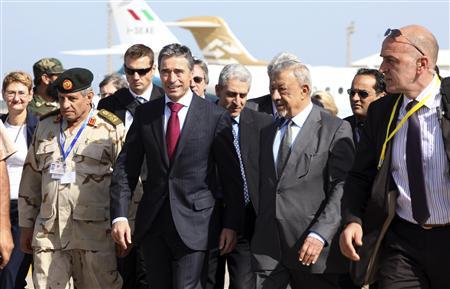The decline of Europe’s strategic Middle Eastern role
https://arab.news/gcw5u

The last couple of weeks in Libya have demonstrated the role of hard power in the Middle East and North Africa (MENA), as Turkey and Russia have increased their military support to rival factions. These developments have highlighted the growing role of Russia and regional actors at the expense of Europe, as Europe’s role as a strategic actor in the region declines.
Europe has long been a key player in the MENA region. In recent history, European countries acted as colonial powers, drawing the Middle East’s modern borders. That era gradually ended, marked by the UK’s withdrawal as the primary naval presence in the Arabian Gulf in 1971, but Europe continued to be an important strategic actor in the region and maintained significant political influence.
In the last decade, Europe’s role in the MENA region has significantly declined, even while it retains economic and cultural influence. The European response — or lack thereof — to events in Libya, Syria, Iran, and Israel and Palestine has undermined its role.
European countries played a major part in the 2011 NATO-led intervention in Libya, but Europe has lost much of the influence that intervention might have brought to the Western powers. European powers have supported different groups in Libya, while Russia and regional actors have provided military support to opposing factions, sidelining Europe.
Europe has also become nearly irrelevant to the civil war in Syria. It was unwilling to provide significant support to pro-democracy Syrian rebels early in the war or to impose military consequences on the Assad regime for its use of chemical weapons. When the conflict created a historic refugee crisis, European leaders responded in different ways, lacking a continent-wide strategy and tending to focus on keeping refugees out rather than addressing the root causes of the crisis. European countries participated in the coalition to fight Daesh and, while this was very important, it reinforced the message that Europe is only willing to use hard power to deal with terrorism and not to support its values or broader strategic interests.
While Barack Obama was US president, Europe remained influential, if only because Washington wanted European partners to support its actions in the MENA region. Europe played a role in US policy toward Libya and Syria and particularly toward Iran. Europe helped to negotiate and implement the Joint Comprehensive Plan of Action (JCPOA) with Iran. When Donald Trump became president, he soon withdrew from the JCPOA despite European objections.
Europe’s efforts to salvage the JCPOA appeared feeble. Tehran hoped that European leaders would take effective action to circumvent the US sanctions. However, the combination of Europe’s economic and financial integration with the US market and a lack of political will soon demonstrated that it would not act as a counterweight. Europe took a long time to set up INSTEX — a mechanism to allow some European trade — and its scope is far narrower than Iran had hoped. European leaders were mostly unwilling to take actions that might have shielded more European companies from US sanctions, and European companies demonstrated that maintaining access to the US market was more important than business opportunities in Iran.
For years, Europe appeared to be important in addressing the Israeli-Palestinian conflict, playing a role in some negotiations and providing significant aid. However, the Trump administration’s approach again demonstrated that much of Europe’s past influence depended on its importance to Washington. The Trump administration moved the US embassy to Jerusalem, cut nearly all US aid to the Palestinians, and supported Israel’s perspective in its proposed peace plan, ignoring European concerns. Europe’s attempts to maintain neutrality in this environment effectively render it irrelevant.
Multiple factors have led to Europe’s loss of political and strategic influence. The Trump administration has made it clear that the US does not need Europe, which damages the latter’s influence globally. European countries have often failed to coordinate their foreign policy, undermining their potential leverage and complicating the EU’s ability to act effectively. In a world with diminishing space for political moderation, Europe’s efforts to be a balancing influence gain little traction. Europe’s reluctance to use hard power has undermined its influence at a time when Russia and MENA’s regional powers are more willing and able to deploy military power.
The Trump administration’s approach demonstrated that much of Europe’s past influence depended on its importance to Washington.
Kerry Boyd Anderson
Europe maintains important economic and cultural relations in the MENA region. However, this is insufficient for it to remain a key strategic actor. For Europe, the consequences are negative. The MENA region poses important risks and offers opportunities, and Europe’s ability to shape those is diminishing. It has less ability to prevent or respond to refugee and migration flows, nuclear weapon threats, terrorist risks, and more. For those who share similar values around human rights and democracy, Europe’s declining influence is also a negative development.
However, for those who see Europe’s legacy in the MENA region as a mixed bag or mostly having negative impacts, Europe’s declining power is a positive development. It leaves more room for regional powers to act independently and with more influence. However, Russia is trying to fill the power vacuum, which may raise new concerns for regional actors.
- Kerry Boyd Anderson is a writer and political risk consultant with more than 16 years’ experience as a professional analyst of international security issues and Middle East political and business risk. Her previous positions include deputy director for advisory with Oxford Analytica and managing editor of Arms Control Today. Twitter: @KBAresearch









































